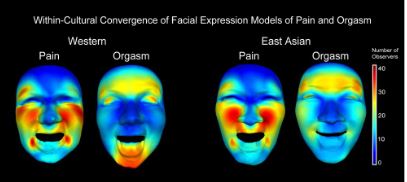
Image: Proceedings of the National Academy of Sciences of the United States of America
A group of psychologists from the University of Glasgow in Scotland, United Kingdom conducted a research which disputes earlier studies that reported facial expressions of pain and sexual pleasure are indistinguishable.
The study, published on Proceedings of the National Academy of Sciences of the United States of America (PNAS) on Oct. 8, saw the researchers model the facial expressions of pain and sexual pleasure in individuals from the Western and Eastern cultures.
The researchers used a data-driven approach to model the mental representations of the facial expressions. They discovered that both Western and Eastern cultures represent pain with similar face movements. Their expressions, however, have slight differences when it came to showing sexual pleasure.
Observers from both cultures were made to view facial animations representing pain and sexual pleasure and categorized whether the animations matched their own mental representations of pain and sexual pleasure.
Results showed that facial expression models of pain were highly similar between Eastern and Western cultures, which included the lowering of the brows, raising of cheeks and wrinkling of nose, as well as stretching of the lips.
When it came to facial expression models of sexual pleasure, however, slight distinctions were found between the two cultures. Western models included the dropping of the jaw, stretching of the mouth, and raising of eye lids in expressing pleasure. Meanwhile, Eastern cultures included the pulling of the corner of the lips.
The study suggests that mental representations of pain and pleasure are statistically related to real-world displays
“Specifically, productions of pain and orgasm share several face movements such as brow lowering, cheek and lip raising, eye closing, and mouth opening, and differ on others such as wincing, chin raising, and blinking,” the study read. “This suggests that although produced facial expressions of pain and orgasm show distinctive features, mental representations are even more distinctive than their real-world displays.”
The findings of the study contribute to the understanding of the possible communicative role of facial expressions. It also opens the discussion to the concept that culture can shape the representation of facial expressions. JB
RELATED STORIES:
Yes, Asia is obsessed with white skin